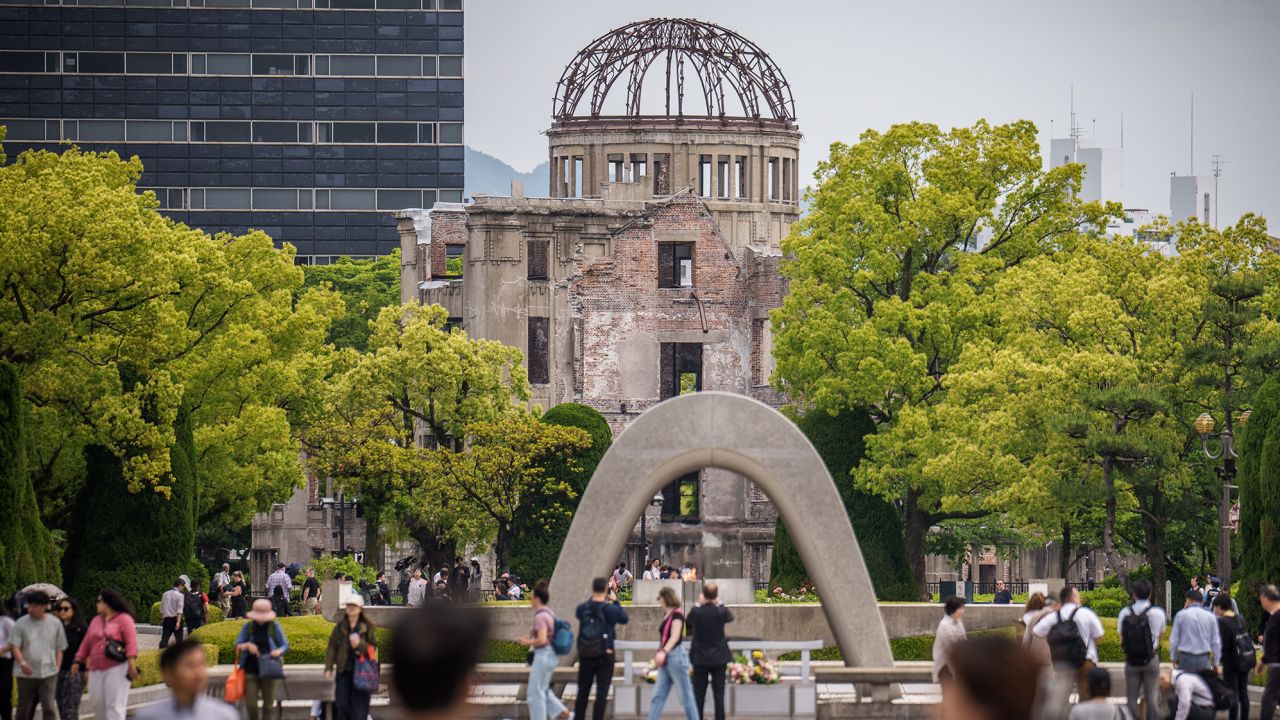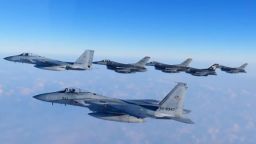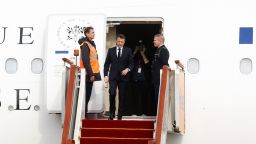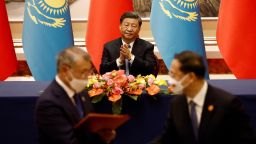As leaders of seven of the world’s most powerful democracies gather in Japan on Friday, it will be the authoritarian powers of China and Russia that dominate the agenda.
The annual Group of Seven (G7) summit, convening this year in Hiroshima, will seek to project a unified response to an increasingly assertive China – and the perceived threat it poses to the stability and economic security of a world already shaken by Russia’s ongoing war on Ukraine.
While much of the attention will be focused on Ukraine – including how to further tighten the screws on Russia and defuse rising nuclear tensions – the three-day summit also provides an opportunity for G7 leaders to recalibrate and coordinate their approach toward China, which has refused to condemn the invasion and instead bolstered ties with Moscow.
“Basically this is going to be a meeting for them to talk about how to deal with China and Russia,” said Yasuhiro Matsuda, an international relations professor at the University of Tokyo.
But agreeing on a common approach to the world’s second largest economy will not be an easy task.
China, a global manufacturing hub and a huge consumer market, is an important trade partner to the G7 countries, which is comprised of the United States, Japan, Germany, the United Kingdom, France, Canada and Italy.
“It is difficult to have one single position on China across seven countries considering their different concerns and relationships with Beijing,” said Sun Yun, director of the China Program at the Washington-based Stimson Center think tank.
“But to the extent that a position with the largest common denominator can be developed, the G7 offers a great opportunity.”
Security in Asia
Projecting unity on China comes at a crucial moment for the US and its allies, as Beijing ramps up diplomatic efforts to repair ties with Europe and drive a wedge in the transatlantic alliance.
Last month, French President Emmanuel Macron caused consternation in Western capitals after he said, following a warm visit to Beijing, that Europe must not become “just America’s followers” and get “caught up in crises that are not ours” when asked about the prospect of China invading Taiwan.
Days later, in an effort to present a united front on Taiwan, the G7 foreign ministers said in a preparatory meeting for the summit that there was “no change” in the bloc’s position on the self-ruled democratic island, which the Chinese Communist Party claims sovereignty over despite never having controlled.
The top diplomats called on China to “abstain from threats, coercion, intimidation, or the use of force” and “reaffirmed” the importance of “peace and stability” across the Taiwan Strait as an “indispensable element in security and prosperity in the international community.”
Japan, the host of this year’s G7 summit and its only Asian member, will position regional security on the summit’s main agenda, said Matsuda at the University of Tokyo.
Deeply concerned about Beijing’s military posturing in the region, Japanese Prime Minister Fumio Kishida has warned publicly that “Ukraine today may be East Asia tomorrow.”
In response to growing threats from China, Japan has moved to double its military spending and is in talks to open a NATO liaison office – the first of its kind in Asia and a sign of deepening ties between Western and Asian democracies.
In a move that highlighted Tokyo’s concerns, China sent a naval flotilla – led by one of its most powerful destroyers – on a 12-day circumnavigation of Japan’s main islands in a display of military power in the lead-up to the G7 summit.
‘Economic coercion’
Another important theme of the summit will be economic security, including how to counter China’s economic pressure tactics.
At a meeting of G7 finance ministers in Japan last week, US Treasury secretary Janet Yellen called for “coordinated action” by G7 nations against Beijing’s use of “economic coercion.”
The tough rhetoric was echoed by European Commission President Ursula von der Leyen this week before she departed for Hiroshima.
“We’ve seen attempts of economic coercion, for example China towards Lithuania; we’ve seen similar practices vis-a-vis Japan and Australia,” von der Leyen said in Brussels Monday, citing Beijing’s recent punishment of the Baltic state for opening a new trade office with Taiwan.
“We are most vulnerable to coercion in general where dependencies built up,” she said, calling for the “de-risking, not decoupling” of economic relationship with China.
The summit will seek to diversify supply chains and reduce heavy reliance on China.
At the front of the push for economic “de-risking” is the US, which has curbed Beijing’s access to advanced semiconductors and the equipment used to make them. It is also seeking to impose new restrictions on outbound investment in China.
But there is the question of how far other countries are willing to follow through.
Japan and the Netherlands have joined the US in the chip curbs, but most countries remain skeptical about the investment controls.
“The problem is all the countries are competing with each other over China’s market, so Beijing’s divide and rule strategy has been working very well,” Matsuda said.
“The G7 is trying to facilitate some norms and rules among themselves first, which can then be enlarged to other like-minded countries in Europe and beyond,” he said.
China closely watching
In an effort to expand the G7’s influence beyond the club of rich democracies, Japan has invited leaders from a long list of developing countries, including India, Brazil, Vietnam and Indonesia, to attend the summit as observers.
South Korean President Yoon Suk Yeol will also join the gathering. Following years of disputes and a long history of acrimony with Japan, the two neighbors are now mending their ties due to growing threats from North Korea and rising concerns about China.
In a sign of a growing trilateral alliance, the US, Japan and South Korea will meet on the sidelines of the summit to discuss plans for the real-time sharing of intelligence – which will further deepen China’s fears of encirclement by the US and its allies.
And with US President Joe Biden cutting short of his Asia trip to address a debt limit crisis, a summit of Quad leaders from the US, India, Australia and Japan could now take also place in Hiroshima instead. The informal security dialogue is widely seen as a counter to China’s aggressive posture in the region.
As the G7 summit gets underway, Chinese officials will be closely watching from Beijing and will not hide their displeasure, experts say.
“The Chinese will not like it and will criticize the ‘cold war mentality’ and ‘bloc politics’ played by the West,” said Sun, the expert with the Stimson Center.
In the lead-up to the summit, Beijing has already berated a statement by G7 foreign ministers.
“It was full of arrogance, prejudice against China and we have made a strong demarche to the host Japan,” Chinese Foreign Ministry spokesman Wang Wenbin said.
Similarly, Beijing also lashed out at accusations of its “economic coercion,” claiming it is the “victim of US economic coercion” rather than a perpetrator.
And while China is not invited to Hiroshima, it is hosting its own summit with Central Asia countries, experts noted.
“Although the timing were not coordinated, it does present the world with China’s effort to build a coalition with its own like-minded countries,” Sun said.
“China still commands a lot of influence.”









